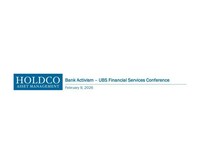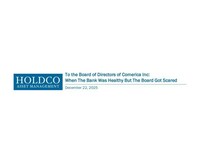
Disclosures in FNBC's Form 10-K Spur Questions
NEW YORK, Aug. 26, 2016 /PRNewswire/ -- Last night, First NBC Bank Holding Company ("FNBC", the "Company") released its restated Form 10-K for the year ended December 31, 2015. HoldCo Asset Management ("HoldCo") has only had a few hours to review the filing, which is voluminous, and plans on releasing a presentation describing its views upon a fulsome review. In addition to the questions outlined in our first two letters1, on first blush, HoldCo has the following questions for the Company:
(1) Capital Adequacy at the Bank Level
In your 2Q16 call report, you disclosed that you are not "well capitalized". You are the only bank above $1 billion in assets in the United States that is not "well capitalized". In your 10-K, you state that as of 2015, your Tier 1 Risk-Based Ratio and Common Equity Tier 1 Ratio are both 7.68% As of 4Q15, no bank in the country above $1 billion in assets has worse ratios on these two measures. On page 15, you explained the risk that you may need to raise capital. Given your unique position as perhaps the worst capitalized bank in the country above $1 billion in assets, do you need to raise additional capital? If so, how much?
(2) Capital Adequacy at the Parent Company
On page 29, you disclose that your Total Risk-Based Capital ratio at the parent company is 9.04% and your Tier 1 Risk-Based Capital ratio is 6.33%. No bank in the country above $1 billion in assets has worse ratios on these two measures. Will the Federal Reserve allow you to continue with these ratios and will they not require you to raise new capital?
(3) Asset Quality
Page 41 showed nonperforming assets increasing from $29 million at the end of 2014 to $164 million at the end of 2015. This means that as of 2015, NPAs constitute 50% of your consolidated tangible common equity, and it means that your parent company "texas ratio" is 41%. On page 100, you show that loans categorized as "special mention", "substandard", and "doubtful" total $376 million. This means that these loans constitute more than 115% of your consolidated tangible common equity. This is a dangerous balance sheet which contrasts sharply with your 2015 call report which demonstrated a much cleaner balance sheet ($48 million of nonperforming assets compared to $164 million in your 10-K). You told us that your restatement related to historic tax credits – not a tripling of nonperforming assets. What is going on here, and what are the implications?
(4) Liquidity
On page 19 you included a risk factor on liquidity. But it is a vague, general statement that does not address actual liquidity risks. Specifically, recently Kroll Bond Rating Agency downgraded your deposits (at the bank) to non-investment grade. To our knowledge, Kroll has never downgraded a bank before and has no deposits rated "junk"2 for any other bank except yours. In addition, your recent call report (see item RCONF051) indicated that 48% of your deposits have an uninsured component (ie are >$250,000). Item RCONJ474 of your call report indicates that only 18% of those deposits are time deposits, implying that a large portion of your deposit base is uninsured and not locked in. Your loan to deposits ratio is high, which means your ability to turn assets into cash is limited. Is this correct? Please describe your liquidity management plan in detail.
(5) Sale of the Company
On page 18, you stated that "the ability to fully utilize our net operating loss and tax credit carryforwards could be limited under Section 382 of the Internal Revenue Code, if we were to undergo a change in ownership of more than 50% of our capital stock over a three-year period as measured under Section 382. The application of these rules is complex and generally focus on ownership changes involving shareholders owning directly or indirectly 5% or more of our common stock. The Section 382 limitations could come into play in the event of the sale of the company, significant new stock issuances or other transactions, including secondary market sales of our common stock. We have no plans to sell the company and do not intend to undertake any stock offering that would have the effect of causing a Section 382 change in ownership." It appears here that you are agreeing with us that a change of control would severely limit an acquirer's usage of your tax credits. Is this a fair characterization? Based on the above, is it fair to say that FNBC will be unable to sell itself for a long, long time and that a sale is therefore off the table?
(6) Deferred Tax Asset Phase-Out
Our first letter delved into the substantial phase-out of your DTA from regulatory capital by 2018. On page 7 you described this process. However, these few sentences do not address the key question: as the deferred tax asset, which as of the end of 2015 is >60% of tangible common equity, increases in value and also substantially phases out of regulatory capital, and as "Investments in Tax Credit Entities", which totaled $109 million on page 110, which we believe is treated 100% in capital today, is whittled down over time – what will this do to your capital ratios and how much capital do you believe you will have to raise? We have expressed our view in our first letter that the amount equates to $300 million, but that was when we trusted the stated cleanliness of your balance sheet. This 10-K demonstrates that your asset quality is substantially worse than previously reported and leads us to conclude that the capital raise will exceed $300 million. How much capital do you think you will need to raise, how will you do it to ensure preservation of the DTA (and no 382 control shift), and when will you do it?
(7) Ongoing SEC Investigation
In your 10-K, you stated in a sentence buried on page 125: "The SEC has commenced an investigation relating to the Company's financial reporting. The Company is fully cooperating with the SEC. The Company cannot predict the duration or outcome of this investigation. Any action by the SEC or other government agency could result in civil or criminal sanctions against the Company and/or certain of its current or former officers, directors or employees." What exactly is this investigation, what does it relate to, what is its seriousness, and what does it mean? Your description is extremely vague and high level. Please clarify with specificity.
About HoldCo Asset Management
HoldCo Asset Management is an investment adviser located in New York City. HoldCo was founded by Vik Ghei and Misha Zaitzeff. HoldCo and its affiliates currently have approximately $400 million under management.
Disclaimer
As of the publication date of this report, HoldCo Asset Management, LP and its affiliates (collectively "HoldCo"), have a long position in the subordinated debt and a short position in the stock of the company referenced herein. Taken as a whole, although HoldCo is long more notional value of debt than it is short market value of stock, HoldCo believes that it holds a directionally short position in FNBC that will profit if the price of FNBC's common stock declines. HoldCo may change its views about its investment positions in FNBC at any time, for any reason or no reason, and at any time may change the form or substance of any of its FNBC investment positions. If it does so, it will not be under obligation to inform anyone.
All content in this report represent the opinions of HoldCo. HoldCo has obtained all information herein from publicly available sources they believe to be accurate and reliable. However, such information is presented "as is," without warranty of any kind whether express or implied. HoldCo stresses that the letter linked to in this press release is a highly imperfect, and very rough, attempt to piece together limited public information to formulate answers to some of the most pressing questions that it has about FNBC. HoldCo is working with SEC filings that are outdated and currently being restated and a recent call report that lacks explanatory footnotes.
This document is for informational purposes only and is not intended as an official confirmation of any transaction. All data and other information are not warranted as to completeness or accuracy and reflect HoldCo's views as of this date, all of which are accordingly subject to change without notice.
This document does not in any way constitute an offer or solicitation of an offer to buy or sell any investment, security, or commodity discussed herein, or any security in any jurisdiction in which such an offer would be unlawful under the securities laws of such jurisdiction.
The information contained in this document may include, or incorporate by reference, forward-looking statements, which would include any statements that are not statements of historical fact. These forward-looking statements may turn out to be wrong and can be affected by inaccurate assumptions or by known or unknown risks, uncertainties and other factors, most of which are beyond the HoldCo's control.
1 http://holdcoam.com/wp-content/uploads/Letter_to_FNBC.pdf & http://holdcoam.com/wp-content/uploads/Second_Letter_to_FNBC.pdf
2 On August 18th, Kroll downgraded the deposit and short-term deposit ratings of First NBC Bank to BB and B, respectively and maintained a Watch Downgrade status on both ratings. According to Kroll, a B rating is defined as "Determined to be of very low quality with high risk of loss due to credit-related events. These issuers and obligations contain many fundamental shortcomings that create significant credit risk." A BB rating is defined as "Determined to be of low quality with moderate risk of loss due to credit-related events. Such issuers and obligations have fundamental weaknesses that create moderate credit risk."
SOURCE HoldCo Asset Management




Share this article